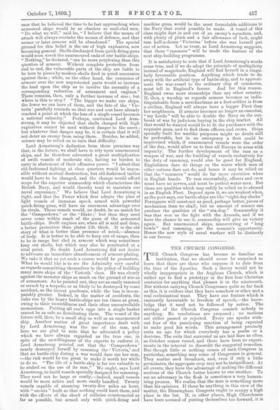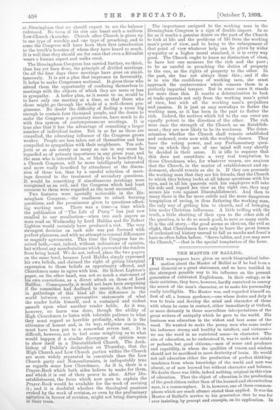THE CHURCH CONGRESS. T HE Church Congress has become so familiar
an institution, that we should never be surprised to learn that there are those who suppose it to date from the time of the Apostles. Such a theory would not be wholly inappropriate in the Anglican Church, which is rather apt to find a prototype in the first four Christian centuries for anything that pleases it in the nineteenth. But without carrying Church Congresses quite so far back as this, it is evident that they have somehow or other met a real ecclesiastical want. They have one feature which is eminently favourable to freedom of speech,—the know- ledge that it need not be followed by action. The sittings of the Church Congress commit nobody to anything. No resolutions are proposed ; no motions are either passed or rejected. Every one speaks with- out fear of the paralysing sanction of being expected to make good his words. This arrangement precisely suits an age for which everybody has a psalm or a doctrine. The evils that surround us are laid bare as often as October comes round, and there have been no experi- ments in the interval to discredit the suggested remedies. But though little or nothing comes of each Congress in particular, something may come of Congresses in general. They scatter seed broadcast, and, even if only a little germinates, the aggregate crop may not be insignificant. At all events, they have the advantage of making the different sections of the Church better known to one another. To see an adversary in the flesh is sometimes a very human- ising process. We realise that the man is something more than his opinions. If there be anything in this view of the matter, the Birmingham Congress ought to occupy a high place in the list. If, in other places, High Churchmen have been accused of putting themselves too forward, it is at Birmingham that we should expect to see the balance redressed. No town of its size can boast such a uniform Low-Church character. Church after Church is given up to one type of worship and one type of preaching, and to some the Congress will have been their first introduction to the terrible heretics of whom they have heard so much. It is well that they should see for once that even a Ritualist wears a human aspect and walks erect.
The Birmingham Congress has carried further, we think, than has yet been done, the principle of divided meetings. On all the four days three meetings have gone on simul- taneously. It is not a plan that impresses us favourably. It helps to make Congresses sectional. It gives those who attend them the opportunity of confining themselves to meetings with the objects of which they are more or less in sympathy. A. better plan, as it seems to us, would be to have only one meeting at a time, so that those who chose might go through the whole of a well-chosen pro- gramme. No doubt the difficulty of finding a room big enough to contain four thousand people, and the desire to make the Congress a pecuniary success, have much to do with this system of contemporaneous meetings. It is true also that it has the advantage of consulting a larger number of individual tastes. But in so far as these are consulted, the educating influence of the Congress grows weaker. People are less taken out of themselves and less compelled to sympathise with their neighbours. Ten sub- jects or so are surely as many as can in any sense be regarded as of primary importance in any given year, and the man who is interested in, or likely to be benefited by, a Church Congress, will be more intelligently interested and more really benefited by attendance at the discus- sion of these ten, than by a careful selection of meet- ings devoted to the treatment of secondary questions. It would be something if simultaneous meetings were recognised as an evil, and the Congress which had least recourse to them were regarded as the most successful. Two features were specially noticeable in the Bir- mingham Congress,—the readiness to admit burning questions, and the prominence given to questions affect- ing working men. There was a time—a time which the publication of " The Life of Pusey " has just now recalled to our recollection—when two such papers as were read on Wednesday by Lord Halifax and Sir Robert Lighten would certainly have produced a riot. The very strongest doctrine on each side was put forward with perfect plainness, and with no attempt to conceal differences or magnify agreements. This time the Congress has re- ceived both,—not, indeed, without indications of opinion, but without any manifestations which prevented the readers from being heard. We do not, indeed, place the two papers on the same level, because Lord Halifax simply expressed his own beliefs, and claimed the right of giving liturgical expression to those beliefs as opportunity offered, and Churchmen came to agree with him. Sir Robert Lighton's paper, on the other hand, was not so much a statement of his own convictions, as a direct attack on those of Lord Halifax. Consequently, it would not have been surprising if the committee had declined to receive it, there being in gatherings of this kind 'all the difference hi the world between even provocative statements of what the reader holds himself, and a sustained. and violent assault upon what another reader holds. As it was, however, no harm was done, though the ability of High Churchmen to listen with tolerable patience to what they must regard as horrible profanity, when it is the utterance of honest and, in its way, religious conviction, must have been put to a somewhat severe test. It is difficult, however, not to feel some misgiving as to what would happen if a similar divergence of opinion were to show itself in a Disestablished Church. The Arch- bishop of Dublin's declaration on Thursday, that the High Church and Low Church parties within the Church are more widely separated in essentials than the Low Church party and Nonconformists, is indisputably true as regards some Low Churchmen. As it is, there is a Prayer-Book which both sides believe to make, for them, and which it is out of their power to alter. After Dis- establishment, the force which now goes to explain the Prayer-Book would be available for the work of revising it ; and it is doubtful whether the theological passions evoked by the work of revision, or even by the preliminary agitation in favour of revision, might not bring disruption in their train. The importance assigned to the working man in the Birmingham Congress is a sign of double import. In so far as it marks a genuine desire on the part of the Church to look at life and the problems of life from the working man's point of view, and to bring to the enlargement of that point of view whatever help can be given by wider sympathy or a higher moral standard, it is in every way good. The Church ought to know no distinction of class, to have but one measure for the rich and the poor ; to be as careful in preaching the duties of property to the one, as the rights of property to the other. In the past, she has not always done this ; and if she is to win the confidence of working men, she must approach the controversies which concern them in a perfectly impartial temper. But in some cases it stands for more than this. It marks a determination to look at trade quarrels not only from the working man's point of view, but with all the working man's prejudices and passion. It is just as easy nowadays to flatter the working man, as it has been in the past to flatter the rich. Indeed, the motives which led to the one error are equally potent in the direction of the other. The rich were once the strength of the Church as an Establish- ment; they are now likely to be its weakness. The deter- mination whether the Church shall remain established. and endowed, rests now with the working classes. They have the voting power, and any Parliamentary ques- tion on which they are of one mind will very shortly be decided in their sense. It is idle to suppose that this does not constitute a very real temptation to those Churchmen who, for whatever reason, are anxious that the Church, in the matter of establishment and en- dowment, should remain as she is. If they can persuade the working man that they are his friends, that the Church to which they belong looks at all labour questions with his eyes, and in all his quarrels with his employers will take his side and regard his view as the right one, they may secure his vote against Disestablishment: And then to many there is the far more subtle and the more dangerous temptation of seeing, in thus flattering the working man, the only way of getting him to church, and of bringing him under Christian influences. A little trifling with the truth, a little shutting of their eyes to the other side of the question, is to do so much good, to save so many souls. It is the old story,—the good seems so obvious, the evil so slight, that Churchmen have only to leave the great lesson of ecclesiastical history unread to fall as monks and Jesuil s have so often fallen before. "Serve tables, and you may save the Church,"—that is the special temptation of the hour.







































 Previous page
Previous page